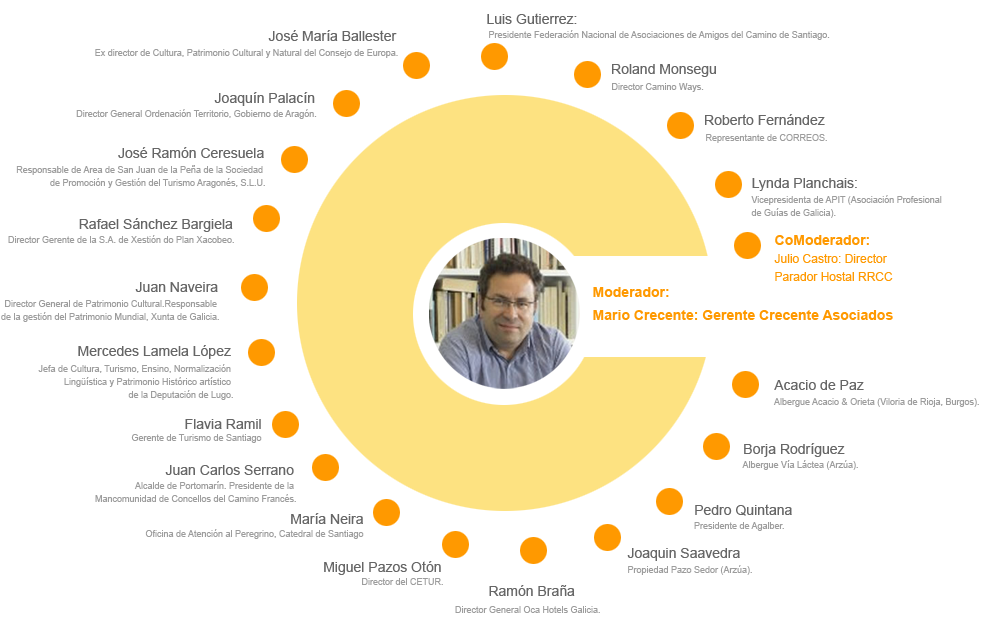Round Table 1- Work load and Reception Capacity along the French Way

The Way of St. James is celebrating its 30th anniversary as a Cultural Itinerary, consolidated as one of the driving forces behind development in the countryside, especially in Galicia, where almost 44% of the municipalities form part of the routes making up the Way.
The Way of St. James is celebrating its 30th anniversary as a Cultural Itinerary, consolidated as one of the driving forces behind development in the countryside, especially in Galicia, where almost 44% of the municipalities form part of the routes making up the Way.
The growth experienced by the Way in recent years is reflected by the statistics published by the Pilgrim Office, which show that the number of pilgrims increased by a factor of 2.77 from 2006 to 2016. Although, in comparison, more and more pilgrims are opting for routes other than the French Way, this is still the most popular route (accounting for 63% of pilgrims in 2016).
In view of these figures, some people are warning about the route becoming overcrowded. It is therefore worthwhile reflecting on the scope of this affirmation as well as its present and future consequences, both from the perspective of the physical workload and the perspective of the local population’s reception capacity. While in the opinion of some, these matters only affect certain points or sections of the Way, for others it is a comprehensive problem leading the Way to a progressive loss of identity and spirituality.
This round table will deal with the problem from a public-private point of view, featuring the participation of representatives of different territorial scales. It will analyse the role of the different administrations involved and the tools that exist in order to maintain competitiveness, without overlooking the threat from the proliferation of unregulated tourist activities.
The final objective is detecting and analysing possible deficiencies in providing services and identifying measures to improve the pilgrim’s experience. The results will enable us to propose coordination models and reach conclusions applicable not only to the French Way but also to other routes and Cultural Itineraries.
Moderator: Mario Crecente: Gerente Crecente Asociados
Co-moderator: Julio Castro: Director Parador Hostal RRCC
Attendees at the table:
- - José María Ballester: Ex director de Cultura, Patrimonio Cultural y Natural del Consejo de Europa.
- - Joaquín Palacín: Director General Ordenación Territorio, Gobierno de Aragón.
- - José Ramón Ceresuela: Responsable de Area de San Juan de la Peña de la Sociedad de Promoción y Gestión del Turismo Aragonés, S.L.U.
- - Rafael Sánchez Bargiela: Director Gerente de la S.A. de Xestión do Plan Xacobeo.
- - Juan Naveira: Director General de Patrimonio Cultural. Responsable de la gestión del Patrimonio Mundial, Xunta de Galicia.
- - Mercedes Lamela López: Jefa de Cultura, Turismo, Ensino, Normalización Lingüística y Patrimonio Histórico artístico de la Deputación de Lugo.
- - Flavia Ramil: Gerente de Turismo de Santiago.
- - Juan Carlos Serrano: Alcalde de Portomarín. Presidente de la Mancomunidad de Concellos del Camino Francés.
- - María Neira: Oficina de Atención al Peregrino, Catedral de Santiago.
- - Miguel Pazos Otón: Director del CETUR.
- - Ramón Braña: Director General Oca Hotels Galicia.
- - Joaquin Saavedra: Propiedad Pazo Sedor (Arzúa).
- - Pedro Quintana: Presidente de Agalber.
- - Borja Rodríguez: Albergue Vía Láctea (Arzúa).
- - Acacio de Paz: Albergue Acacio & Orieta (Viloria de Rioja, Burgos).
- - Luis Gutierrez: Presidente Federación Nacional de Asociaciones de Amigos del Camino de Santiago.
- - Roland Monsegu: Director Camino Ways.
- - Roberto Fernández: Representante de CORREOS.
- - Lynda Planchais: Vicepresidenta de APIT (Asociación Profesional de Guías de Galicia).














